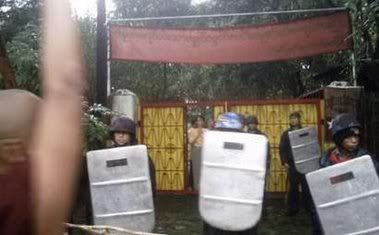
Noble Prize Winner and Legitimate Burmese Prime Minister, Aung San Suu Kyi
Like most places the British formerly conquered, colonized, and eventually retreated from, the country of Burma is extraordinarily fucked up. In 1948, the British empire granted Burma independence. At the time, it was one of the wealthiest countries in the East, rich in natural resources. In 1962, amid economic and political turmoil, the Burmese military, led by Ne Win, seized control of the country in a coup d'état. Rangoon University students staging a peaceful protest against the government were shot down. Such began the military junta government's policy of killing unarmed protesters. That was just one of Ne Win's great accomplishments. Another was changing the denominations of Burmese bills to multiples of 9. He did this, allegedly, because his personal fortune teller told him it would make him live to be 90 (he lived to be 92).
Ne Win's decision destroyed what was left of the Burmese economy. Left with worthless currency, the Burmese people increasingly began to demand democracy. Protests, led by college students and supported by the country's influential monks, spread throughout the country. In 1988, facing a country rife with poverty and simmering in discontent, Ne Win "retired." But just as the Burmese people began to hope for democracy, a new military junta was installed (widely believed to be influenced by Ne Win), under the leadership of General Saw Maung. He crushed the pro-democracy demonstrators, killing more than 3,000 people in what came to be known as the Four Eights Uprising.
Saw Maung continued to lead Burma into isolation from the rest of the world, and continued Ne Win's policy of ruling with an iron fist and itchy trigger finger. He created the State Law and Order Restoration Council (now called the State Peace and Development Council), an Orwellian body dedicated to torturing, killing or imprisoning anyone deemed to be against the dictatorship. He also changed the name of Burma to Myanmar, a change not recognized by the United States and U.K.
In 1990, bowing to international pressure, Myanmar held free elections for the first time in 30 years. The National League For Democracy won nearly 59% of the vote. The military-supported National Unity Party won 21 percent. Refusing to relinquish power, the military junta declared the election invalid, and placed the democracy party's leader (and elected prime minister) Aung San Suu Kyi, under house arrest. Aung San was awarded the Nobel Peace Prize in 1990 recognizing her struggle for Burmese civil rights, and spent all of the 1.3 million in prize money to aid the health and education of the Burmese people. She remains confined to her home, under heavy guard and without access to the outside world, to this day.
In 1992, Saw Maung resigned (citing health reasons) and Than Shwe took power. Initially thought to be more liberal, he maintained a hardline against democracy efforts. He's best known for spending three times the country's health budget on his daughter's wedding while the country is starving. Last year, the dictatorship moved its capital from Yangon (formerly Rangoon) to a field in the middle of nowhere. The field is in a region known for being difficult for foreign armies to invade. But the cost of moving all the government facilities and military infrastructure to such a remote region nearly bankrupted the country. As a result, on August 15th, 2007, the military junta doubled the price of fuel (which they control). The increase in price for this basic necessity, along with already inflated prices for other basic goods and services, led to the most recent protests. On August 19, 400 people marched against the government, and were quickly pacified. On September 5, three monks were injured when the government cracked down on a peaceful protest in the town of Pakokku. The monks of Pakokku demanded an apology by September 17, which they did not receive. The next day, tens of thousands of monks marched on Burma's major cities. One rally marched past the house of Aung San, where the picture above was taken.
What happened next was...
The last 50 seconds or so of this video is pretty terrifying. That's when the shots ring out:
They kill journalists in Burma:
BBC on Burma:
CNN reports on Burma's brand of police brutality:
Video here.
Burmese villages are disappearing under mysterious circumstances.
Where have all the monks gone?
Is Burma heading towards genocide? Rambo says so.
[UPDATE 10/11:] It's getting worse every day.
Thanks to the BBC, ol' reliable Wikipedia, Global Voices, and all, the, blogs, from, Burma for informing me about a nation, and a tragedy, we Americans don't get to learn a lot about.
No comments:
Post a Comment